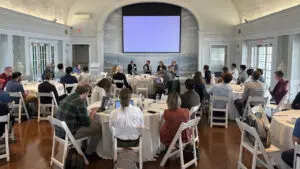From June 9–11, 2025, a gathering of prominent cancer researchers took place in Greenwich, Connecticut. The event focused on exchanging research findings, fostering collaboration, and strategizing advancements in the treatment of fibrolamellar carcinoma (FLC). This marked the sixth international summit of key FLC researchers hosted by the Fibrolamellar Cancer Foundation (FCF).
To promote the open exchange of unpublished data and ideas, the conference operated under a multi-party non-disclosure agreement. FCF has long believed that such collaboration is essential to make rapid progress in developing new therapies for fibrolamellar patients. However, the summit’s opening keynote session, titled Oncogene Targeted Immunotherapy in FLC, was open to the broader fibrolamellar community. Dr. Mark Furth (FCF) moderated a discussion by Dr. Juliane Walz (University of Tübingen) and Dr. Mark Yarchoan* (Johns Hopkins University), the principal investigators of clinical trials of FLC-specific therapeutic vaccines. They were joined by Molly Hones, a FLC patient participating in one of these trials. A recording of the keynote is available on FCF’s YouTube channel.
The main convening began with a progress report on the development of consensus treatment guidelines for FLC led by Drs. John Gordan* (UCSF) and Allison O’Neill* (Dana-Farber Cancer Institute). The main goal of that effort is the publication of guidelines based on the experiences of multiple clinicians at leading academic medical centers across the United States.
A deep dive into specific features of FLC cancer cells critical for their growth and survival included presentations from Drs. John Scott* (University of Washington), Yasemin Sancak (University of Washington), John Gordan, Taran Gujral (Fred Hutch), and Nabeel Bardeesy (Massachusetts General Hospital). The potential vulnerabilities represent opportunities for targeted therapy. A broad goal of these studies is to identify drugs and drug combinations already approved by the FDA or in clinical development for other cancers which might be “repurposed” to treat FLC. In a similar vein, Dr. Boris Pasche (Wayne State University) introduced the gathering to a medical device that uses tuned radiofrequency electromagnetic fields to attack specific cancers. The device has received FDA approval to treat conventional hepatocellular carcinoma and is being tested for potential activity against FLC.
A session on FLC immunotherapy included detailed presentations on the peptide vaccines highlighted in the keynote. Another major topic was the development of cell-based therapy using receptors by which immune T cells recognize FLC cancer cells. A third key discussion area was the augmentation of FLC therapy by overcoming immune-suppressive factors in the tumor environment. Presenters included Drs. Walz, Yarchoan, Jens Bauer (University of Tübingen), Paul Thomas (St. Jude Children’s Research Hospital), Praveen Sethupathy (Cornell University), and Jason Carter (University of Washington).
The conversation then shifted to FLC oncogenesis and model systems for lab research and therapeutics discovery. The presenters were Drs. Sean Ronnekleiv-Kelly (University of Wisconsin–Madison), Anneliese Gest (University of California San Diego), Theo Hirsch (INSERM–Paris), Aleksander Skardal (Ohio State University), Benedetta Artegiani and Delilah Hendriks (both from Princess Máxima Center, Utrecht), and Wencheng Zhang (Tongji University, Shanghai). Key topics included the induction of FLC in mice, studies of FLC in three-dimensional “organoid” cultures, assay systems to find therapeutic drugs, and the genetics of other liver cancers with interesting similarities to FLC.
A panel discussion on clinical trial strategies featured Drs. William Harris (University of Washington), James Geller (Cincinnati Children’s Hospital), Juliane Walz (see clinicaltrials.gov identifiers NCT05937295 and NCT06789198), and Allison O’Neill (Dana-Farber). Active clinical trials involving on FLC diagnostics or treatment were presented by Drs. Marina Baretti (Johns Hopkins University; NCT04248569 and NCT06027086), Michael Ortiz (Memorial Sloan Kettering Cancer Center; NCT06620302), Kimberly Riehle (Seattle Children’s Hospital), Jessica Gartrell (St. Jude Children’s Research Hospital; NCT05468359), and Razelle Kurzrock* (Medical College of Wisconsin, NCT05674825).
The summit concluded with a discussion of resources that support the entire FLC research community. Patty Cogswell (FCF) spoke about tumor collection and uses of the FCF Biobank, housed at Massachusetts General Hospital. Presentations on multi-omics by Don Long (Cornell University) and on the new FLC Data Initiative by Surya Saha (Velsera) highlighted how the availability of data is enhancing research capabilities.
The 2025 FLC Scientific Summit was a significant milestone in the growing collaboration among cancer researchers who are committed to sharing insights and developing new treatment approaches for this disease. FCF thanks all the world-class laboratory and clinic-based scientists who made the conference a great success!
* Member of FCF’s Medical and Scientific Advisory Board

